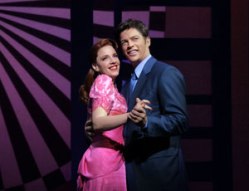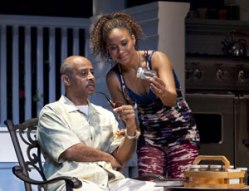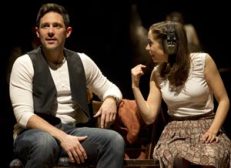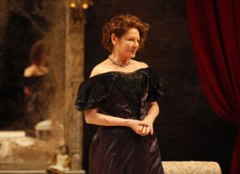Category: "Review"
Review: On a Clear Day You Can See Forever
Dec 12th

In the musical On a Clear Day You Can See Forever, we learn that the central character experienced a past life and suffered an untimely end, only to be reborn in a new incarnation. Such is the case, too, with this 1965 musical by Burton Lane (music) and Alan Jay Lerner (lyrics and original book), which is now being given new life in a revival starring Harry Connick Jr. and featuring a completely rewritten book by Peter Parnell. Unfortunately, history is likely to repeat itself--like its previous version, this Clear Day suffers from an unworkable book. The only difference is that it’s unworkable in a completely new way.
In the original, which starred John Cullum and the great Barbara Harris (both received Tony nominations, as did the score), a psychiatrist takes on a new patient, Daisy Wells, who has the gift of ESP and who under hypnosis reveals that she is the reincarnation of a free-spirited 18th century woman named Melinda Wells. The shrink soon falls in love with Melinda, much to the consternation of Daisy, who by then has fallen for him herself.
Not surprisingly, this silly scenario received a proper drubbing from the critics, and despite its lovely score the show ran a mere 280 performances. Nor did the property fare much better when it was made into a 1970 movie starring Barbra Streisand and Yves Montand.
Director Michael Mayer’s re-conception, set in 1974, provides a gender change for Daisy, who is now David (David Turner), a 29-year-old gay florist with commitment issues. In his past life he was a 1940s-era female jazz singer (still named Melinda Wells), and it is her with whom Dr. Mark Bruckner (Connick) falls in love. Meanwhile, David, despite the fact that he has a gorgeous boyfriend (Drew Gehling), finds himself falling for the shrink, who fails to inform his patient that the reason for their countless hypnosis sessions is so he can spend more time with Melinda.
Needless to say, this lends a fairly complex spin to what was already an outlandish scenario. Bruckner, who is now the show’s main focus, somehow falls for Melinda even though she’s embodied by David. (Of course, the audience sees what he sees, namely the lovely actress/singer Jessie Mueller as Melinda.) In one of the more bizarre musical numbers, he dances with both David and Melinda, in a sort of choreographic ménage a trois.
To say that this doesn’t work is an understatement. Not helping matters is that Connick doesn’t begin to have the acting chops to pull off what would be a challenge for even the most experienced actor. Most of the time, except of course when he’s singing, he looks awfully uncomfortable onstage, and when the moment comes when he’s about to kiss his male co-star it’s clear that the curtain can’t come down fast enough.
Turner is another problem. His fussy, mannered performance lacks the required charm, and he doesn’t have the voice to pull off such powerful numbers as “What Did I Have That I Don’t Have?” On the other hand, Mueller, a Chicago performer here making her Broadway debut, does nicely by Melinda, and infuses her jazz-tinged numbers with real feeling. Of the rest, Sarah Stiles steals her scenes as David’s BFF; Drew Gehling displays a killer voice on such songs as “Love With All the Trimmings”; and Kerry O’Malley makes the most of her thankless role as the shrink’s colleague who’s secretly in love with him.
Director Mayer handles the show’s physical complexities—the action frequently shifts back and forth between 1974 and 1944, with David suddenly transforming into Melinda—with his usual professionalism. But the look of the production is godawful. You can’t blame Catherine Zuber’s costumes, which are hideous, but then again pretty much all clothes from that era were. But Christine Jones’ set--featuring a profusion of pop-art style graphics and a garish color scheme that looks like an explosion at a paint factory—is a true eyesore.
Fortunately, the gorgeous score provides plenty of compensations, especially when it’s being sung by Connick in his heartthrob style. Augmented here by a couple of numbers written for the movie and others taken from the score of the film “Royal Wedding,” it’s a consistent delight. When Connick belts out the dynamic “Come Back to Me” or croons the gorgeous title number, almost, if not all, can be forgiven.
St. James Theatre, 246 W. 44th St. 212-239-6200. www.Telecharge.com.
Review: Stick Fly
Dec 9th

It’s a long weekend’s journey into night at Stick Fly, Lydia R. Diamond’s overstuffed play about an African-American family’s tumultuous reunion at their summer home on Martha’s Vineyard. Featuring an ungainly mixture of social, racial and economic commentary and soap opera-style histrionics about who slept with whom, this comedy/drama wears out its welcome long before the conclusion of its overly long running time. Featuring among its many producers the pop star Alicia Keys, who also contributed the original music, the play will face a steep uphill climb in the currently difficult Broadway environment for new pays sans marquee names in the cast.
Taking place in a lavishly appointed home that the Playbill pointedly informs us in not located in Oak Bluffs, the play introduces us to the LeVay men and the women in their lives. Patriarch Joe (Ruben Santiago-Hudson) is a neurosurgeon who--judging by the fact that he has shown up alone—might be experiencing some marital difficulties.
Eldest son Flip (Mekhi Phifer) is a well-heeled, cocky neurosurgeon who arrives with his new and very white girlfriend Kimber (Rosie Benton). His younger brother Spoon (Dule Hill), who has just finished writing his first novel, brings along his fiancé, Taylor (Tracie Thoms), a graduate student specializing in the study of insects (hence the title).
Also on hand is Cheryl (Condola Rashad), the young and pretty daughter of the housekeeper, who is temporarily filling in for her sick mother. Despite her modest upbringing, she’s been educated at one of Manhattan’s finest private schools.
Immediately, tensions start to flare among the group. The two brothers clearly have a sibling rivalry; Flip and Taylor were obviously once romantically involved in one way or another; and Taylor, harboring not-so-secret jealously, unleashes a racially and socially charged diatribe against Kimber.
But things go downhill even from there, with the revelation of a dark secret that turns all of the relationships upside down and threatens to drive everyone even further apart.
While the juicy melodramatic aspects of the play are entertaining enough, especially with the frequently nasty one-liners (most of them delivered by Phifer’s Flip) constantly being thrown about, the playwright gets in over her head when attempting to delve into deeper sociological issues. And the predictability of the plot twists proves wearisome, although clearly not to the many audience members who were gasping at the not exactly revelatory developments.
Director Kenny Leon is unable to bring any stylistic coherence to the evening, with the result that the proceedings seem to shift wildly between wacky farce and Eugene O’Neill-style drama. And although both Rashad, so powerful a couple of seasons back in Ruined, and Santiago-Hudson, who knows enough to underplay, both shine, the rest of the performers are undone by the broadness of the writing.
Cort Theatre, 138 W. 48th St. 212-239-6200. www.Telecharge.com.
Review: Once
Dec 7th

When the indie film musical Once was released five years ago, it became a critical and box-office sensation. This touching tale of the relationship between a Dublin Irish street musician and the Czech émigré who helps him find his musical voice had a refreshingly modest charm. So it was heartening to hear that its theatrical adaptation would be receiving its world premiere at the New York Theatre Workshop, clearly not a venue for glitzy, overblown musicals.
And yet, for all the modesty of its approach, this version still seems somewhat glossy and bloated. For one thing, the simple tale, told in just 90 minutes on film, now runs nearly two-and-a-half hours. And the lead characters, dubbed just “Guy” and “Girl,” are no longer the scruffy, realistic figures originally embodied so memorably by Glen Hansard and Marketa Irglova, who also wrote the music and lyrics. Here, they are played by Steve Kazee, so Adonis-hunky that it’s a wonder that his character hasn’t already reached stardom of Bruce Springsteen proportions, and Cristin Milioti, so cutely adorable that she should be the star of her own sitcom.
Since the stage production couldn’t exactly replicate the streets of Dublin, Bob Crowley’s evocative set recreates the most Irish thing imaginable—a pub. Indeed, before the show starts, the cast members are up on stage having a rowdy time singing and playing musical instruments, with audience members welcome to come up and buy drinks at the “bar,” free to either linger for a while onstage or bring them back to their seats.
The ensemble--many of them doubling as musicians--sits around the perimeter of the set when not involved in the action. Among the standouts are David Patrick Kelly, as the Guy’s elderly Da; Paul Whitty, as a protective friend of the Girl; and Andy Taylor, as a bank manager comically self-deluded about his own musical talents.
The score, all of which comes from the film, retains its folksy appeal, even if it’s not particularly theatrical--the standout, not surprisingly, is the gorgeous, Oscar-winning “Falling Slowly.” It’s all beautifully sung by the cast who—thanks to the movement choreographed by Steven Hoggett (Black Watch)—also imbue their musicianship with tremendous physicality.
The book by Irish playwright Enda Walsh (Penelope, The Walworth Farce) is rather too elongated, but it’s also undeniably witty and certainly sharper than the film version, which had a semi-improvised feel. And John Tiffany has staged the proceedings with a smooth fluidity that keeps the action flowing nicely.
I wish I could say that I fell in love with Once the way that I suspect many audiences are bound to. But then again, that’s the way love is, isn’t it?
New York Theatre Workshop, 79 E. 4th St. 212-279-4200. www.ticketcentral.com.
Review: The Cherry Orchard
Dec 6th

The stifling languorousness that so often afflicts contemporary productions of Chekhov is thankfully nowhere in sight in this Classic Stage Company’s revival of The Cherry Orchard. Directed by Andrei Belgrader and featuring a stellar cast including Dianne Wiest, John Turturro, Daniel Davis, Juliet Rylance, Roberta Maxwell, Josh Hamilton, Michael Urie and the great Alvin Epstein, this literally lighter version is very easy to take.
For starters, the new translation by John Christopher Jones (a veteran actor with no shortage of Chekhov experience himself) manages to trim the play to a fast-paced two-and-a-quarter hours including intermission without leaving it feeling overly truncated. The language is easy on modern ears, but not anachronistic.
The lightness of tone is immediately established by Santo Loquasto’s all-white set, featuring a tiny miniature of a train, which is revealed by the parting of a gauzy curtain.
Unevenness of tone and acting styles is almost always a problem with Chekhov productions, but this rendition is more graceful than most. Director Belgrader has elicited terrific performances from his ensemble, beginning with Wiest, who previously excelled in the same venue in a production of The Seagull. The actress brings a tremulous vulnerability to Ranavskaya, the financially bereft owner of a large estate that her scheming neighbor Lopakhin (Turturro, providing his usual compelling intensity) proposes be divided into small lots.
Daniel Davis is equally moving as Gaev, her equally self-deluded, pie-in-the-sky, older brother, while Juliet Rylance is luminous as Varya, the daughter with whom Lopakhin is hopelessly in love.
The smaller roles are expertly handled as well. Josh Hamilton is touching self-effacing as the young radical Trofimov; Siblings Katherine and Elizabeth Waterston are both beautiful and engaging as the miserable daughter Anya and randy servant Dunyasha respectively; Michael Urie is amusing as the fumbling servant Trofimov; and Roberta Maxwell is hilarious as the governess Charlotta, even if her interactions with various audience members are a little over-the-top.
And of course there’s Epstein, as the forlorn, aged servant Fiers, who is so poignantly abandoned at the play’s conclusion. Shuffling onto the stage wearing his nightshirt, he single-handedly embodies the playwright’s weaving together of pathos and humor that this production so effectively realizes.
Classic Stage Company, 136 E. 13th St. 212-352-3101. www.classicstage.org.
Review: Bonnie & Clyde
Dec 2nd

One might think that true-life, murderous outlaws wouldn’t exactly be a likely choice for musical treatment, but then again composer Frank Wildhorn has already put songs in the mouths of such characters as Dracula and Dr. Jekyll and Mr. Hyde. So it comes as little surprise to encounter his latest effort, Bonnie & Clyde, especially when you consider that the title characters have the advantage of having died while still being young and sexy.
And, boy, is that sexiness accentuated in this musical starring two of Broadway’s hottest new commodities--Laura Osnes (Grease, South Pacific) and Jeremy Jordan (the recent pre-Broadway tryout of Newsies). Each is given plenty of opportunity to show skin: Osnes, displaying the sort of toned, Pilate’s body that wasn’t exactly commonplace in 1930’s Texas; and Jordan, spending much of the proceedings shirtless and glistening with fake sweat.
It’s not surprising that the show would aim for the same sort of appeal to younger audiences that made Arthur Penn’s now iconic 1967 film starring Warren Beatty and Faye Dunaway, both at the peak of their beauty, such a hit.
Critics have long used Wildhorn as a punching bag due to his propensity for the sort of vacuous pop ballads that performers love to sing on American Idol. So it’s a pleasure to report that the best aspect of this show is its score, which uses a melodic blending of folk, country, blues and gospel influences to stirring effect. Sure, some of the composer’s usual bombast occasionally rears its head, but such terrific numbers as “”The World Will Remember Us” and “Raise a Little Hell” are ample compensation.
Too bad, then, that the book and lyrics are such letdowns. The former, by Ivan Menchell (The Cemetery Club), provides little in the way of character development or emotional resonance. It settles for such easy devices as having childhood versions of the characters appear in the opening song, “Picture Show,” proclaiming that they want to grow up to be like Clara Bow and Billy the Kid respectively. The banal lyrics by Don Black aren’t any more impressive, although admittedly it wouldn’t do to have the uneducated characters displaying Sondheim-style wit.
Jordan easily displays the charisma that has him marked for stardom, making Clyde far more appealing than he has a right to be. And Osnes once again impresses, if less so for her acting—her Bonnie is fairly one-note—than for her dynamic presence and powerful singing voice, which she shows off to impressive effect in her second act power ballad, “Dyin’ Ain’t So Hard.” Claybourne Elder has little to work with as Clyde’s brother and fellow criminal Buck, but Melissa Van Der Schyff has some terrific moments as Blanche, the sister-in-law who reluctantly gets drawn into the family business.
Jeff Calhoun’s staging and minimal choreography is little more than functional, as is Tobin Ost’s wood-planked unit set. But the latter does provide for the production’s strongest element, namely the extensive projections (designed by Aaron Rhyne) that often showcase vintage photographs of the real-figures involved, culminating in gruesome images of their bloody corpses. They serve as a vivid reminder that this romanticized musical deals not with headstrong youngsters but rather brutal killers who met a fateful end.
Gerald Schoenfeld Theatre, 236 W. 45th St. 212-239-6200. www.Telecharge.com